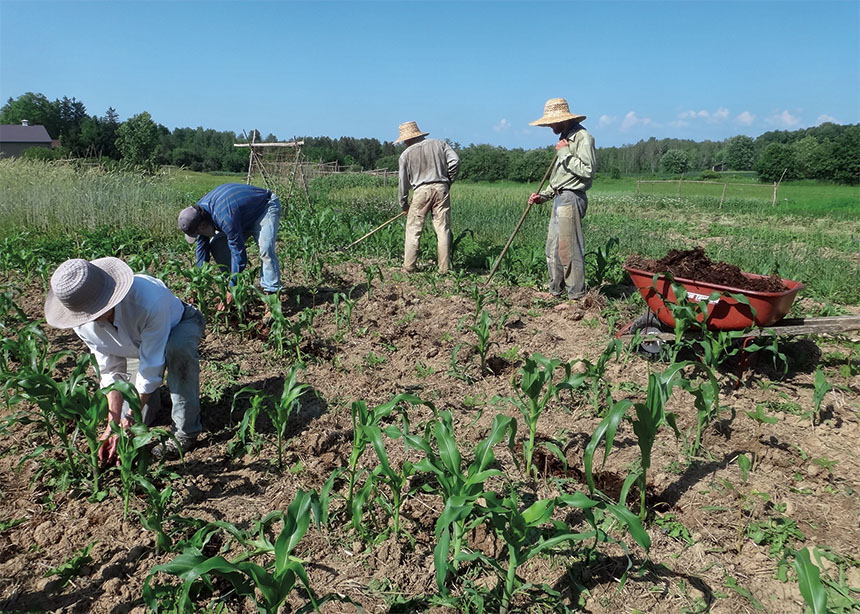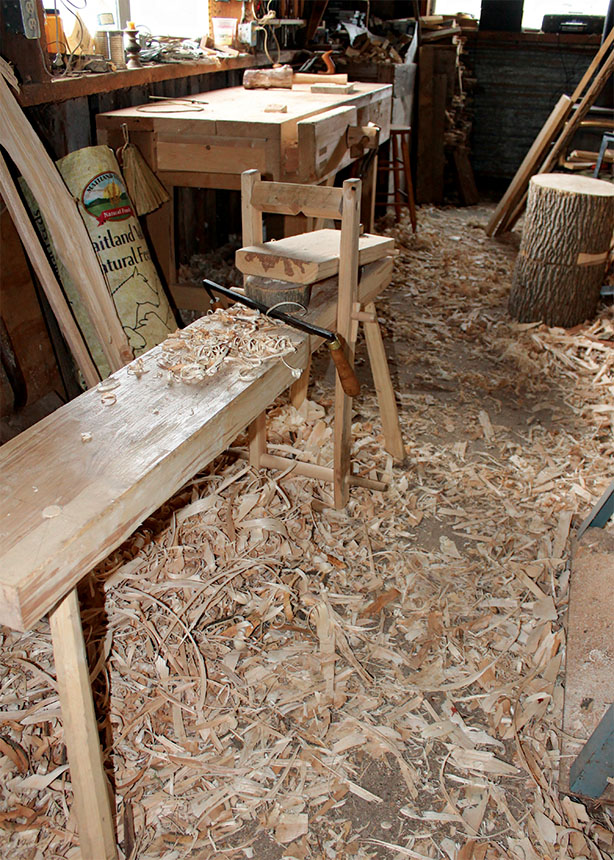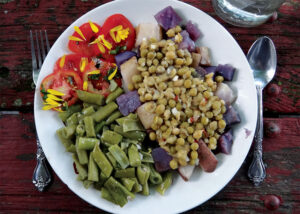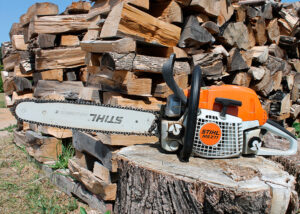On a hundred hilly acres near Mildmay, Ontario, the Wiederkehr family is quietly pushing the limits of human energy, spiritual integrity and disconnection from the consumerist web. The following is the first in a series of bi-monthly dispatches from their family.
If you were to visit my family’s home and stroll about with a sharp eye (consider yourself invited to do so), you’d notice some peculiar contrasts. In our ageing farmhouse, a conventional electric stove sits unused in the kitchen while we cook on a wood-burning rocket stove outside. We grow nearly all our own food, including carbs and protein, but we also buy a few foods we don’t really need.
My brother, my parents and I do a lot of our work using the strength of our bodies, but we also use a tractor for some jobs. There’s a much-used flock of bikes in our shed and a car in the driveway with a cobweb in the angle of the door mirror.
I hope the incongruities that a visitor might notice would raise questions: What are these people trying to do? Why? What implications does that have for this place, and also for other places and the people who live in them?
Such questions arise naturally when one is faced by people making unusual choices. But actually, my family thinks that everyone, everywhere, should be asking such questions of themselves.
The systems that support the lives of nearly all present-day humans cannot be sustained. Especially in places like Canada, many of us consume and waste on far too large a scale. More subtly, but perhaps more importantly, we frequently fail to fit our consumption and waste into natural cycles. Even if we were to cut back, our systems still couldn’t be sustained.
Our systems are unloving in two ways. They cause great harm through exploitation and pollution, and they are a cultural dead end by which we claim privileges of comfort, security and power that others won’t be able to have.
As a family, we feel our faith calls us to reimagine these systems so they can be sustained in an ecological sense while also being just. In the process, we end up grappling with a lot of complexities and compromises. We have a lot to discuss while weeding together in the garden.
Facing responsibilities
In this series of articles, we will share about how we live and why.
Do not mistake these for sketches of an idyllic “simple life.” Sitting in front of a glowing wood stove in winter is nice, but ever since we sold our chainsaw, our sore sawing muscles have put that comfort into perspective.
Instead of simplifying our own lives by ignoring problems and our complicity in them, we seek to examine and refashion our motives, goals, choices and actions. As we scale up our gardening, plastic drip tape, plastic mulch and row covers would come in handy, but we know those things would just be sweeping our problems under someone else’s carpet. We resist these temptations with reluctance and a degree of hypocrisy. For now, our gardens are still protected from varmints by electric fence.
We make these choices in light of our faith. The ways we choose to live can look simple, but in a way, facing the consequences of your decisions is the most complex way to live.
As physical creatures, humans receive what we need for life from the physical world: air, water, earth and living creatures. I’ll call this “land.” It is not our dependence on land that has caused our present mess—we cannot resign from this dependence except by death. Rather, the problem is our misuse of land, our displacement of costs to land elsewhere, and our greed in taking too much.
Being alive leaves us with the responsibility to choose which land to depend on and how it will be treated.
It is normal in our culture to sidestep responsibility for these choices by simply buying items off a shelf and leaving the details to people unseen and unknown. In practice, those others usually cannot or will not take on our responsibilities. This leaves a moral gap in which shortcuts abound. Mainstream environmental “solutions” such as electrified transportation or buying local food reliably fall into this trap.
Part of the reason we as a family have chosen to work with this specific plot of land is that we are accepting the complexity of choice. We seek to not offload our responsibility onto others, but to own the choices about how our lives will be supported.
Far away for God
The story of how our family came to this place and to this way of living can be told in two ways: as a continuous, gradual process or as a discontinuous conversion, a profound shift. Both contain truth and can be found woven into the story that follows.
My name is Andre. My brother is Theo. Our parents are Ruth Isaac and Miles Zimmerly. We all share the last name Wiederkehr, chosen by my parents when they married. In German, it means “return.” Humans often move apart, away, breaking apart rather than building up; this name reminds us to return again and again to each other and to our commitments, including our faith and what it asks of us.
My parents both grew up on fairly conventional, fairly small farms, Ruth in the Niagara region of Ontario and Miles in Wayne County, Ohio. Both grew up in and joined Mennonite congregations.
My dad trained in agronomy, then spent three years with Mennonite Central Committee (MCC) in Bangladesh. My mom served with MCC’s SALT program and studied theology in Winnipeg. They then went to Anabaptist Mennonite Biblical Seminary in Indiana, where they met. They married during Ruth’s first pastorate, in Saskatoon. Following that, they moved with MCC to the L’Arche-style farm community at Ignatius Jesuit Centre near Guelph, Ontario. Theo was born there in 1997.
I was born two years later in Hamilton, where Ruth had taken a pastoral position at Welcome Inn. In 2001, we moved back to Ignatius, where Miles farmed for the Jesuits until that position was discontinued.
In 2007, my parents decided it was time to follow my mother’s childhood sense of calling to “go far away for God.” We went to Cambodia with MCC for three years.
Living in Cambodia showed us that the North American norm is not the only way to live, and that we often confuse our wants for needs. We also came to see many connections between North Americans’ choices and harms in other places.
Each of us feels differently about the value of our time in Cambodia as we weigh it against the environmental harms and cultural/racial problems inherent in that way of trying to help people. But we all agree that the experience continues to shape the thinking behind decisions on issues such as how to cook or get around.
Continuity and conversion
On our return to Canada, my parents decided it was time to follow my father’s dream of finding a farm. In April of 2011, we moved to the 100 acres where we now live, about 90 kilometres northwest of Waterloo. Here, we established a small farm business selling meat and eggs. We became a part of Hanover Mennonite Church, where we continue to be active members.
After high school, Theo and I both went to the University of Waterloo, living as a part of the Conrad Grebel University College community. Theo took Peace and Conflict Studies and I studied General Science and a lot of other things. During that period, our family went through major shifts in perspective. We began a rapid move away from the farm business we had been running and toward subsistence farming. While the two are fundamentally different, it’s unlikely that we would ever have ended up where we are without the background in more normal farming.
After graduating, Theo and I decided to return home to make subsistence the goal of our full-time work. Both affirmed and challenged by this complicated gift, our parents have been changing what they do so that they can work with us in this direction. Among other changes, my dad quit his off-farm job and my mom has been working on accommodating her dietary restrictions within what we can grow.
Our various church involvements over the years have helped make us who we are, but we also find ourselves at odds with how the church is actually practising the values that have been formed in us. While the work we now choose looks very different from our past involvements, we see it as part of a long tradition of Mennonite values and beliefs. Our way of living out Mennonite values is our response to problems we see in the church’s conventional ways of working.
Comparing notes
Remember the incongruous combination of practices I described at the start of the article? In light of that, I want to note two things.
One is that we’re trying to learn many new skills and design a lot of new systems as we walk the path toward living sustainably. It’s a lot of work and that work will happen faster, better, and with less loneliness if it’s shared. If you are experimenting with or know how to weave fabric or grow cover-crop seed using hand tools or design a solar cooker, we’d love to learn from you. If you’d like to hear more about a skill we mention so that you can try it, we’d love to share what we’ve learned.
Second, we are in the midst of transition. We have not nearly arrived at sustainable and just ways of living; don’t mistake us for a finished project. But, as I hope will become clear in future instalments of “Humans and Humus,” we have already changed profoundly and swiftly, and this realization is key. Change is possible for ordinary people like us, and you.
We’re nervous to share where we’re at. On the one hand, we’re not far enough in our journey, and on the other hand, we’re so far along that we worry about scaring people off. So we thank you for engaging with our ideas and stories.









Leave a Reply
You must be logged in to post a comment.